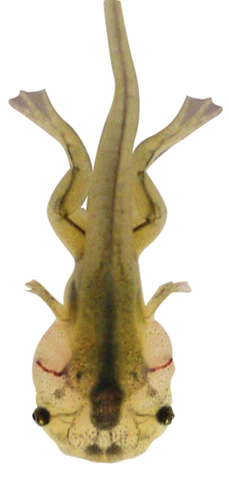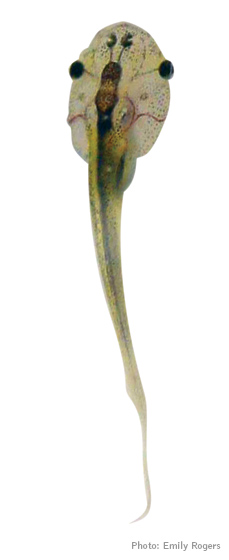


Upon the Waters
by Kelli Whitlock
Intro/ Chemicals Out of Place
| Provacative Results


Tadpoles on Prozac (below) develop more slowly into frogs than tadpoles in control groups (above). Developmental delays could threaten tadpoles who live in seasonal pools and puddles.

Provactive Results
When Black and Armbrust first conducted an extensive review of the scientific literature to see what was already known, they found evidence to suggest that Prozac affected the reproductive systems of clams. Was it possible that other forms of aquatic life were affected as well?
Early results in Black’s lab suggested that SSRIs may indeed cause problems for a range of organisms. For one thing, fish and frogs exposed to SSRIs were lethargic, which could leave them easy targets for predators. But on a deeper biological level, Black and UGA post-doctoral fellow Theodore Henry, now on the faculty at the University of Tennessee, observed that relatively low concentrations of Prozac in mosquito fish led to developmental delays, particularly in the formation of reproductive tissue. Because reproductive success in fish depends heavily on timing, even modest delays could leave them unable to generate new broods and ultimately lead to population declines. Henry also found increased mortality and lower reproductive rates in daphnids, tiny crustaceans commonly used to evaluate a compound’s toxicity in aquatic environments.

The group’s most provocative results so far have involved amphibians. Serotonin is believed to affect thyroid function, which is particularly important in frogs because thyroid hormones are thought to trigger their metamorphosis. In one set of experiments, Black and doctoral student Emily Rogers discovered that exposure to Prozac slowed this essential process. “The delay’s biggest problem is that it can leave frogs totally vulnerable for much longer periods,” said Black, and not only with respect to predation. Many tadpoles undergo metamorphosis while nestled in small pools of ephemeral waters on land. If their developmental timing is off, the water could dry up before the immature frogs complete this stage.
Studies by Armbrust and post-doctoral fellow Jeong Wook Kwon also are yielding interesting findings, particularly on Prozac’s environmental persistence in water and sediment. “If it’s in water,” Armbrust said, “it’s not going to break down quickly – the half-life there is about four months. And in sediment, it doesn’t seem to biodegrade at all.”
Despite their early results, Black and Armbrust are not yet prepared to sound any alarms on SSRIs in the environment. They suspect that the degree of impact depends not so much on short-term concentrations, even if relatively intense, but on long-term exposures to constant environmental levels of the drugs. The latter occurrence is likely, given that people who take SSRIs usually do so for long periods of time. But because that cumulative effect on populations of aquatic life has not been demonstrated, it is what the researchers plan to explore next.
“From an ecological standpoint, the preservation of biodiversity is so important,” Black said. “The loss of one species may not seem that critical, but could be very critical if it was the sole food source for another species.”
In the past, a lack of technology and information may have limited scientists’ ability to see the big picture on water quality, but research advances over the past few decades may be changing the situation, Black suggested. “Perhaps now that we’re looking more holistically at watersheds,” she said, “we’ll see things we missed before.”
For more information, contact Marsha Black at mblack@uga.edu or access www.uga.edu/publichealth/ehs/dept/people/mblack.html
Kelli Whitlock is a freelance science writer based in Ohio.
Intro/Chemicals Out of Place
| Provacative Results
For comments or for information please e-mail the editor: jbp@ovpr.uga.edu
To contact the webmaster please email: ovprweb@uga.edu
![]()